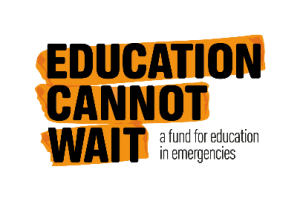Source: UN
WHS: New fund launched at UN humanitarian summit to address education in crisis zones
“Action now has to happen urgently because of the sheer scale of numbers of children impacted,” said UN Special Envoy for Global Education Gordon Brown, who presented the ‘Education Cannot Wait’ fund at the World Humanitarian Summit (WHS), a two-day conference that opened today in Istanbul, Turkey.
Specifically designed for education in emergencies, the fund aims to reach more than 13.6 million children and youth living in crisis situations, such as conflict, natural disasters and disease outbreaks, with quality education over the next five years.
“These young people are missing out on schooling and this is becoming a full-blown global crisis that will haunt the world for generations,” Mr. Brown stressed.
On average, the UN estimates that less than two percent of humanitarian aid currently goes towards funding education. Moreover, education systems equipped to cope with protracted crises cannot be built on the foundations of short-term – and unpredictable – appeals.
‘Education Cannot Wait,’ which has a funding target of $3.85 billion over five years, aims to bridge the gap between humanitarian interventions during crises and long-term development afterwards, through predictable funding.
As thousands of participants gathered at the Summit to discuss how to strengthen the humanitarian system to alleviate and prevent the suffering of millions worldwide, UNICEF warned that one in four of the world’s school-aged children – nearly half a billion – live in countries affected by crises. Around 75 million of these children and youth are either already missing out on their education, receiving poor quality schooling or at risk of dropping out of school altogether.
A special session at the Summit underlined how education systems are being destroyed by violent armed conflict, natural disasters and health emergencies, robbing children of the skills they need to build safe, strong communities and economies when they reach adulthood.
Sarah Brown, the Executive Chair of the Global Business Coalition for Education and President of the children’s charity TheirWorld, is giving a voice to refugee children by displaying some of their artwork at the Summit. Youth worldwide, many of whom fled the Syrian crisis, illustrated what a safe school means to them.
Sarah Brown talks about “TheirWorld” and Education Cannot Wait fund Credit: UN News Centre
The UN News Centre caught up with Ms. Brown at the Summit’s exhibition fair. Her full radio interview can be accessed here.
“Children don’t need education even in emergencies; they need education especially in emergencies,” stressed UNICEF’s Executive Director, Anthony Lake.
“Without an education, how will they gain the knowledge and skills to chart their own futures – and to someday lend their hands to building more peaceful, stable futures for their societies? And how can we hope to reach our global development goals for education if we don’t focus on children trapped in humanitarian emergencies – who represent almost half of all children out of school today?” Mr. Lake asked.
Answers to these questions will continue to be raised on the second and last day of the World Humanitarian Summit, as government representative and leaders from the private and public sectors work together to commit to the five core responsibilities of the UN Secretary-General’s Agenda for Humanity:
- Prevent and end conflict
- Respect rules of war
- Leave no one behind
- Working differently to end need
- Invest in humanity
Many more sources to follow up:
Source: INEE
Education Cannot Wait: a fund for education in emergencies
One in four of the world’s school-aged children – 462 million – now live in countries affected by crisis. Of these, 75 million children aged 3-18 years, living in 35 crisis-affected countries, are in desperate need of educational support.Education for these children has long been neglected, but there is a growing recognition of its central importance.
Built on extensive consultation and dialogue among a range of stakeholders, Education Cannot Wait – a fund for education in emergencies is an education crisis fund designed to transform the global education sector, including both humanitarian and development responses. Launched at the World Humanitarian Summit in May 2016, the fund aims to deliver a more collaborative, agile, and rapid response to education in emergencies in order to fulfill the right to education for children and young people affected by crises. It is about both restoring hope to millions of children and demonstrating that the governments who signed the 2030 Sustainable Development Goal pledge intend to keep their promise.
For more information, visit www.educationcannotwait.org.
Core Functions and Operationalization of the Fund
Five core functions have been identified for the Fund, each of which directly address obstacles which were identified as playing a significant role in preventing or limiting education responses in humanitarian crises:
- Inspire political commitment so that education is viewed by both governments and funders as a top priority during crises
- Plan and respond collaboratively, with a particular emphasis on enabling humanitarian and development actors to work together on shared objectives
- Generate and disburse additional funding to close the $8.5 billion funding gap needed to reach 75 million outofschool children and youth
- Strengthen capacity to respond to crises, nationally and globally, including the ability to coordinate emergency support
- Improve accountability by developing and sharing knowledge, including collection of more robust data in order to make betterinformed investment decisions, and knowledge of what works
The Fund will be operationalized through two mechanisms:
The Acceleration Facility (5 percent) will provide “catalytic support grants” to global and regional players so they can improve the effectiveness, the cost-effectiveness and scale of existing approaches to education in emergencies.
The Breakthrough Fund (95 per cent) will support country-level initiatives undertaken by governments and implementing partners and include:
- A rapid-response mechanism focused on returning children and youth to education. The mechanism will fund safe learning spaces, teaching and learning materials, innovative delivery models and psychosocial support. It will also invest in improving planning for short- and medium-term needs.
- A multi-year window that supports long-term plans and the provision of learning opportunities and consolidates existing humanitarian and education sector plans, facilitating a coherent, coordinated approach.
- A pop-up facility that enables non-traditional donors such as the private sector and philanthropists to quickly and easily channel financial support to a specific country, region or part of a country’s national plan, without cumbersome procedures that often hinder timely support for education in emergencies.
The Education Cannot Wait Fund will scale up resource mobilization over the first five years, commencing with an aim to raise approximately $150 million in the first year and with an ambition to bring funding to a level of $1.5 billion in the fifth year. This involves an overall 5-year fundraising ambition of $3.85 billion.
The Fund’s resource mobilisation efforts will aim to bring in new, untapped resources, rather than reallocating existing funds. However, the Education Cannot Wait Fund is not intended to close the overall funding gap in education in emergencies and protracted crises. It has been designed to act as a catalyst and its approaches are designed to incentivise interest, action and additional funding, from across the humanitarian and development continuum.
The Fund will be established and hosted at UNICEF initially. A decision regarding the permanent home of the Fund and its relationships with existing mechanisms will be made after the first year of the Fund’s operation. This will be informed by a formal review of hosting opportunities which will include a call for expression of interest from potential hosts.
Summary of commitments
At the launch event in May 2016, donor representatives from the United Kingdom, the United States, Norway, the European Union and the Netherlands stepped up and pledged $87.5 million* or just over half of the $150 million needed to fully fund year one.
Non-state pledges for the first year included a $2.5 million contribution from Dubai Cares to support initial set-up of the Education Cannot Wait secretariat bringing the total to more than $90 million. The Global Business Coalition for Education also committed to ‘mobilize $100 million in financial and relevant in-kind contributions.’
*Donor commitments made at the May 23, 2016 launch event:
- US = $20 million
- UK = £30 million over two years
- EU = €5 million
- Norway = $10 million
- Netherlands = €7 million
- Dubai Cares = $2.5 million
Follow future commitments and fundraising at www.educationcannotwait.org.
Resources
- Education Cannot Wait – Case for Investment (PDF) ENG | FRE | SPA
A summary description of: the impact of crises on education; the proposed solution; the urgency of acting now; and a call for support.
Education Cannot Wait, May 2016- Educaiton Cannot Wait: Frequently Asked Questions
Education Cannot Wait, February 2017- Education Cannot Wait: proposing a fund for education in emergencies (PDF)
Outlines the potential operation of Education Cannot Wait.
Overseas Development Institute, May 2016- A common platform for education in emergencies and protracted crises (PDF)
Provides the background evidence that informs the Education Cannot Wait process.
Overseas Development Institute, May 2016
- The fierce urgency of now: delivering children’s right to education during crises (PDF)
- Sets out the role the UK should play in the Education Cannot Wait effort.Global Campaign for Education UK, May 2016
- Report on the INEE Global Consultation, Phase II (PDF)
A summary is available in English, français, español, português, العربيه.
INEE, March 2016
- Infographics – Download images individually and in composite, in both .png and .pdf formats.
Opinions
- Education Cannot Wait Fund Officially Launched: More Than $90 Million Pledged
by Kolleen Bouchane, GCE US; Global Business Coalition for Education; Theirworld, 26 May 2016
- Education Cannot Wait Platform: Four ingredients for success
by Sarah Smith, International Rescue Committee, 20 May 2016
- The Education Cannot Wait Fund: Imperfect, but a Great Start in an Imperfect World
by Robert Palmer, University of Nottingham and NORRAG, 18 May 2016
- Show Me the Money. Crises, Education and the Hard Work Ahead
by Kolleen Bouchane, GCE US; Global Business Coalition for Education; Theirworld, 16 May 2016
- Which way to the platform, please?
by GEM Report, 11 May 2016
- Five reasons why we need a global fund for education in emergencies
by Susan Nicolai, Overseas Development Institute, 3 May 2016
- Global charities call on world leaders to fund education in emergencies
by A World at School, 8 Apr 2016
- Education cannot wait for conflict and crises to end [infographic]
by Global Partnership for Education, 7 Apr 2016- Education in Emergencies: It’s Worse Than We Thought
by Kolleen Bouchane, GCE US; Global Business Coalition for Education; Theirworld, 18 Mar 2016- Education cannot wait, and yet it always does
by Kate Redman, GEM Report, 1 Nov 2015











